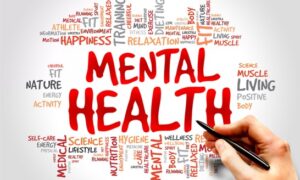
Mental health includes a person’s emotional well-being, ability to adapt to change and build healthy relationships. It also includes a willingness to seek help and the capacity to overcome challenges.
Most people who have mental illnesses can manage their symptoms with talk therapy (psychotherapy) and medications. They can live meaningful lives, achieve goals and contribute to their communities.
Take care of yourself
Mental health includes a person’s overall psychological, emotional and social wellbeing. It affects the ways they think, feel and react to stressors.
Serious mental illness can pose logistical challenges, like finding affordable housing, securing transportation to and from appointments and figuring out how to pay for medication. Try to find out what your loved one needs and then offer to help.
Self-care is much more than just a one-time treat like scheduling some alone time or booking a spa day. Instead, focus on establishing consistent habits that help you recharge and stay healthy.
Seek help
Everyone needs to be heard and understood. That’s even more true for those dealing with mental health challenges.
A reluctance to talk about mental health can contribute to the stigma that surrounds it. That makes it hard for people to get the help they need.
If someone you know seems depressed or anxious, ask them to see a doctor. Mental illnesses don’t go away on their own and they can have serious consequences if untreated. It’s also important to be aware that people with psychosis often hear voices and have paranoid beliefs.
Talk to someone
If you’re having trouble coping, reach out to someone. Counselling can improve anyone’s mental health. It is not a sign of weakness or poor character to seek help.
Drastic changes in a person’s thoughts, feelings or behaviour can be a sign of a mental illness. If you notice any signs, talk to a primary care provider or a mental health professional.
Treatment—often a combination of medicine and psychotherapy—can help people with mental health conditions manage their symptoms, feel better, and lead productive lives.
Do something you enjoy
Just as physically healthy people are better able to bounce back from illness and injury, so too do people who have good mental health. While not a substitute for counseling, talk therapy or medicine, the following everyday mental health tips can help elevate moods and build resilience. They can also help you enjoy life more. Staying connected means spending time with loved ones and focusing on activities you love. Especially as COVID-19 restrictions continue to lift, spend safe face-to-face time with those who energize you.
Stay connected
Thoughts of anxiety are common, but they should not be allowed to isolate you from friends and loved ones. Stay connected through telephone, email and video conferencing. Many support groups are moving meetings online and on digital platforms.
There are also plenty of mental health apps available that can help you cope and work through your feelings. Just remember that they are not a substitute for face-to-face interactions. For caregivers, there are also family programs that may be helpful.
Stay positive
Many people with mental health issues feel isolated, so it’s important to make an effort to stay connected. This could mean going to a support group or finding other ways to connect with others.
It’s also important to stay positive and remember that recovery from a mental health issue is often a process with ups and downs. Be patient and show your loved one compassion. They don’t deserve to be treated like a failure. Rather, they deserve to be seen as someone who is trying their hardest.